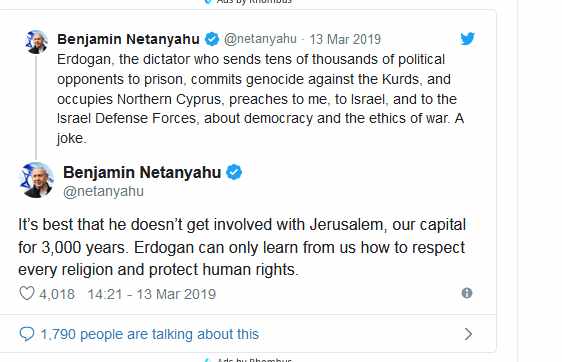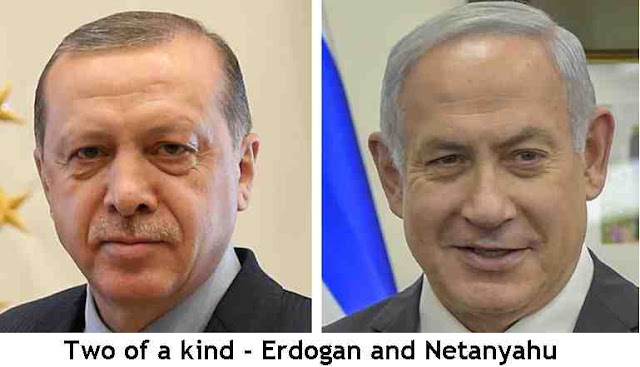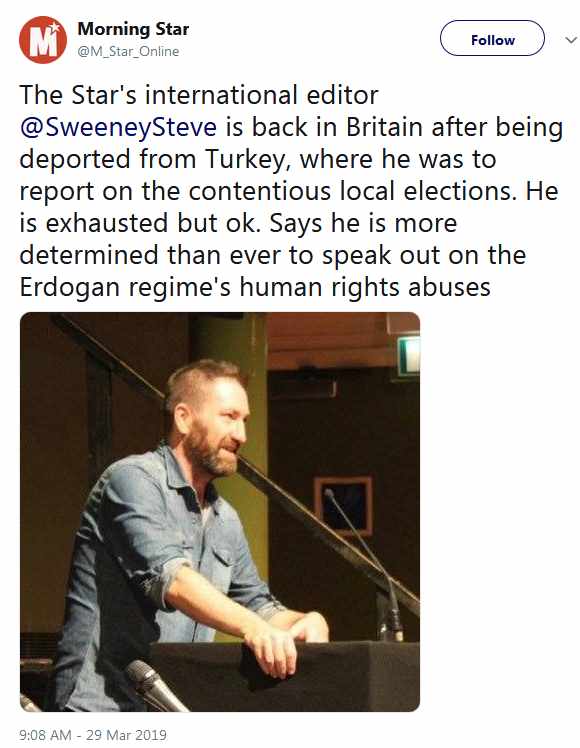Why Palestine solidarity
activists should not give any support to the Erdogan dictatorship in Turkey
Below is an
important article from
Canary and another from Al Jazeera. Last Thursday I went to a meeting and heard
the description, by the Morning Star's International Editor Steve Sweeney, of Turkey’s
reign of terror in the Kurdish parts of Turkey.
Steve spent a harrowing time in Turkey reporting what was happening in
Turkish Kurdistan. By all accounts he was lucky to escape with his
life.
All the
elected parliamentary representatives of the HDP,
a mainly Kurdish party, are in prison. Some 60
mayors of Kurdish towns have been replaced by hand picked Erdogan
representatives.
On June 23
there will be a rerun of
the Mayoral election that was held on March 31st in Istanbul. Erdogan's
AKP party lost in March but he ‘persuaded’ the Supreme Court to annual the
elections and hold them again.
The story of
what happened in Cizre in Kurdistan is sickening. After a siege of the city,
Turkish troops entered and poured petrol into basements where civilians were hiding burning 176 people – men, women and children - alive.
 |
| Child searching in what is left of his home |
No
principled supporter of the Palestinians can do anything other than condemn
Turkey’s genocidal attacks on the Kurds, both within Turkey and in Syria.
Many
Palestinians turn a blind eye to what Turkey does because of the rhetorical
attacks from Erdogan on Netanyahu.
However this ignores the reality of Israel’s economic relationship with Turkey
for example Turkey’s agreement with Israel on the gas reserves in the
Mediterranean.
 |
| The devastation in Cizre matches anything in Gaza |
One
thing is for certain. The existence of dictatorial and repressive regimes like
Turkey, which oppress their own people and deny self-determination to the
Kurds, cannot be of any benefit to the Palestinians. This should be one of the lessons that should be drawn from the PLO's relationship with repressive Arab regimes before and after Oslo.
What
is equally disgraceful is the fact that Britain, the European Union and the United
States have declared the PKK, the Kurdish Workers Party, which is fighting Erdogan’s
murderous army ‘terrorists’. If ever
there was proof that one man's freedom fighter is another man's terrorist, this is it.
Tony Greenstein
 |
| Turkish 'pacification' in Sizre |
Turkish
president Recep Tayyip Erdoğan and Israeli
prime minister Benjamin Netanyahu continue
their familiar feud, using social media and public speeches to blast each
other. Meanwhile, #WeAreErdoğan trends on Twitter, as thousands of people claim
to stand with the authoritarian Turkish president, while at the same time
supporting Palestinians in their struggle.
As Palestine
solidarity activists, it is vital to remind ourselves of the similarities
between Turkish and Israeli state policies. If we stand for the liberation of
Palestinians, we must also stand for the liberation of Kurdish people against
their Turkish oppressor.
Palestine as propaganda
For years,
Erdoğan has used the occupation of Palestine as a propaganda tool to increase
his popularity and to mobilise grassroots Muslim supporters. It’s no
coincidence that Erdoğan took the opportunity to insult Netanyahu at an
election campaign rally this week.
Portraying
himself as an anti-colonialist with decent moral values, Erdoğan succeeds at
his task of winning over supporters. Turkish flags can be seen in some houses
and shops in the West Bank, while Palestine solidarity activists retweet Turkish
state propaganda.
In 2017, US
congresswoman Ilhan Omar tweeted about
meeting with the Turkish president. While in 2018, Rachel Corrie’s parents accepted
an award from Erdoğan on behalf of their daughter. Corrie
was murdered in Gaza in
2003 by the Israeli military. At the ceremony, her parents thanked Turkey and stated that “world
citizens needed to reject destructive nationalism and racism more than ever.”
Palestine
solidarity activist Benjamin Ladraa, who inspired lots of us when he walked
from Sweden to Palestine, attended the same
awards ceremony in Istanbul, meeting the
dictatorial president and his wife.
These
meetings occurred after Turkey, under the leadership of Erdoğan, committed the biggest
massacre of its Kurdish population since the 1990s,
displacing thousands and killing hundreds, including children. Meanwhile this
week, Erdoğan called Netanyahu a “tyrant who slaughters 7-year-old Palestinian
kids.”
So, let’s
look at the similarities between Erdoğan and Netanyahu and the countries
they’re leading.
 |
| Part of the pathetic repartee between 2 dictators |
Murders
Between 2009 and 2019, Israeli occupation forces murdered 3396 Palestinians, of whom 774 were children. Despite this, Netanyahu had
the audacity this week to tweet in reply to Erdoğan:
Similarly, Turkey has killed hundreds of its Kurdish citizens since
2015, including 176 people who were murdered when they were trapped in basements in the city of
Cizre in early 2016. Many of them, including children, were burnt alive by
Turkish soldiers. The government branded all those killed as “terrorists”.
 |
| The Sur part of the city of Diyarbakir Satellite photos taken before and after Turkey's bombardment |
Razing homes
In 2018, the Israeli occupation demolished 460 Palestinian structures, displacing people who had nowhere else to live.
The state continues to ethnically cleanse Palestinian areas in its relentless
pursuit of Zionist expansion. As armed forces bulldoze homes, villages are in
danger of disappearing completely off the map. So far in 2019, demolitions
continue on an almost daily basis.
In Turkey, between 2015 and 2016, armed forces displaced around 500,000 majority-Kurdish people as they terrorised and flattened whole
neighbourhoods in Kurdish cities. Many of these people were not able to return
to their homes. Turkey has also ethnically cleansed and currently
occupies the majority-Kurdish region of
Afrin in Syria.
Imprisonment
This week, Netanyahu tweeted again:
Indeed, Turkey imprisons and tortures political opponents, and is the number one country in the world for imprisoning journalists critical of the government.
But Israel, too, continues to imprison Palestinian citizens. There are
currently 5,440 political prisoners languishing in Israeli jails, including 209 child prisoners. 493 prisoners are serving sentences of more than 20 years.
Punishing human rights observers
As Netanyahu talks nonsense on social media about protecting human
rights, the Israeli state continues to target and punish those who attempt to document its crimes against Palestinians. The
international observation group, Temporary International Presence in Hebron
(TIPH), was permanently expelled from the West Bank in February 2019. At the same time, international
group Ecumenical Accompaniment Programme Palestine Israel (EAPPI) was forced
to leave Hebron due to Israeli settler
harassment. The lack of international observers means that Israel can act with
total impunity as its armed forces terrorise the streets of Hebron.
Meanwhile in Turkey, human rights defenders continue to be locked up and
charged for ‘membership of a terrorist organisation‘, and international journalists are expelled under the same charge. In 2015, Turkish police murdered prominent human rights lawyer Tahir Elçi. He was shot in the head.
Shooting protesters
Both Israel and Turkey crack down heavily on protesters. There are
numerous reports about the Israeli forces’ barbaric shooting of Palestinian
protesters at Gaza’s Great
March of Return. Israel frequently fires at
demonstrators in the West Bank, too. The military uses live bullets, rubber-coated steel bullets and stun grenades on
protesters, as well as drones to fire tear gas canisters at them.
Meanwhile, Turkish forces fire tear
gas at mothers holding demonstrations for their
children who were disappeared by the state. Turkish police fire rubber bullets and pepper spray at women demonstrating on International
Women’s Day. And in 2013, much was written about police violence and the weaponry used during Istanbul’s Gezi Park protests.
Racism
Netanyahu recently stated on social media that:
Israel is the nation state of the Jewish people – and only it.
He too is hoping to rally support for the upcoming April election by stoking racism among citizens. His comment comes
after the passing of Israel’s ‘nation-state’ law, which declares that ‘the right to exercise national self-determination in the State of
Israel is unique to the Jewish people.’ The law also axes Arabic as an official
language of Israel.
In Turkey, Kurdish has never been an official language, despite around 25 million Kurdish people living in the country. Turkey’s policy is to attempt to
stamp out Kurdish culture and assimilate people into being ‘Turkish’. Those who
won’t be assimilated face imprisonment.
War crimes
In 2018, Human Rights Watch stated that Turkey’s attacks
on Afrin “may be unlawful“. And the Permanent Peoples’ Tribunal found Turkey guilty of war crimes against the Kurdish people.
Similarly, in February 2019, the UN admitted that Israel’s murder of
protesters in Gaza “may constitute war crimes.”
Despite these allegations, both countries continue to act with impunity,
safe in the knowledge that western states need them as allies. And besides,
there’s money to be made in selling both countries weapons.
So while both Netanyahu and Erdoğan yell virtual insults at each other,
it’s important to remember that both leaders have blood on their hands. Don’t
naively believe the pro-Palestine propaganda coming from Turkey’s power-hungry president. Stand in solidarity with both Kurdish and Palestinian
peoples as they struggle against those who want to wipe them from existence.
Get involved
- Both Turkey and Israel need to buy their weapons from international arms companies. These arms companies are coming to London in September to make deals and sell weapons at one of the world’s biggest arms fairs. Visit Stop The Arms Fair to find out how to get involved.
- Turkey is a member of NATO. This December, leaders of the
NATO-member states will be coming to London for a NATO summit. On 24
March, you can attend a
meeting among activists in London, discussing how to oppose the summit.
Cizre
in ruins as Turkey lifts curfew on Kurdish towns
Kurdish civilians returned to widespread
destruction after months of fighting between Turkish forces and the PKK.
by Kiran
Nazish
13 Mar 2016


Rows of houses and apartment
buildings in Cizre have collapsed, and the structures that are still standing
have broken pillars and parapets, burned bricks and bullet-scarred walls [Kiran
Nazish/Al Jazeera]
Cizre, Turkey -
Shop owner Emre Tatlisoz's home was once three stories high. Today, it is
nothing more than a pile of rubble.
The house next door is equally unrecognisable, as is
the next one, and the one after that. The streets of Nur Mahallesi, a
neighbourhood in Cizre in southern Turkey, have been hard-hit by clashes
between Turkish government forces and Kurdistan Workers' Party (PKK) fighters.
A 24-hour curfew was imposed on the town of about
130,000 people last December, and was only lifted this month. Residents
who had fled the violence were allowed to return to Cizre on March 2, but many
quickly discovered they had little to come home to.
"This was not sudden. It is hard see it, but we
had imagined this in our fears," Tatlisoz said as he surveyed the
destruction. "This is why we were asking the world to look at us, but
we were ignored by the media."
He told Al Jazeera that he first planned to stay in
Cizre despite the curfew, but left after his neighbour's home was hit by
shelling, and he saw a sniper shoot and kill a man in front of his house.
"Fleeing was a risk, too, with my young
children … and we left under constant shooting over our heads," Tatlisoz said.
Turkey launched a widespread security operation
against the PKK, a Kurdish nationalist group that Ankara, the United States and
the European Union consider a terrorist organisation, in July 2015.
PKK fighters have taken responsibility for deadly
attacks on Turkish forces and police after a recent ceasefire between the group
and the Turkish government collapsed last summer. The decades-long conflict
between the Turkish state and the PKK has killed at least 30,000 people.
The recent operation was focused largely on
Kurdish-majority areas in southern Turkey.
The Turkish army claimed that more than 600 PKK fighters were killed in Cizre alone. Turkey also
informed the United Nations that 205 members of the police, gendarmerie and
military were killed between July 20 and December 28, 2015.
A Turkish police official, who spoke on condition of
anonymity because he was not authorised to speak to the media, told Al Jazeera
that the goal of the recent operation was "to kill PKK terrorists and
anyone who will support their ideology.'' Turkish officials say the
fighting was focused on neighbourhoods that housed barricades built by local
fighters.
But Ali Ihsan Su, the governor of Sirnak province
where Cizre is located, said the Turkish authorities did not distinguish
between civilians and fighters.
They attacked callously and mercilessly, without
distinguishing between military, police, women, men, old or young.
|
"They destroyed houses by placing explosives from
the kitchens to the bedrooms," Su said. "They attacked callously and
mercilessly, without distinguishing between military, police, women, men, old
or young."
Earlier this month, Tesmeen Yildiz, a woman in her
60s, stood outside her home waiting for neighbourhood boys to bring her son's
charred remains up from the basement. Her son insisted on staying to watch over
the house, she said, and he died when the home was attacked by Turkish forces.
Yildiz maintained that her son was not a member of the PKK.
Videos and images shared by Cizre residents showed Turkish
forces opening fire on civilians. A video shot by local journalist Refik Tekin - in which
a group of civilians carrying white flags are fired upon - went viral in late
January, and led the UN High Commissioner for Human
Rights, Zeid Raad Al Hussein, to call on Turkey to investigate the
shooting of unarmed civilians.
"The authorities must take great care to protect
human rights when conducting military or security operations. If state
operatives commit human rights violations, they must be prosecuted," Al
Hussein said in a statement.
Amnesty International also warned that "the
Turkish government's onslaught" in Kurdish towns and neighbourhoods put
200,000 lives at risk and amounted to collective punishment.
Despite being able to return home, many residents of
Cizre said they were planning to relocate to nearby towns, or seek shelter with
relatives elsewhere in Turkey. Those who do plan to remain will face an uphill
battle to rebuild.
An official with the Turkish prime minister's office
told Al Jazeera that the government has "pledged to launch public housing
projects and provide financial assistance to communities affected by
terrorism", but he did not provide further details. Asked
about allegations of human rights violations by the Turkish government,
the official did not directly respond, instead noting that the PKK's violence
"did more harm to the Kurds" than anybody else.
Some neighbourhoods, including Sur Mahallesi, Cudi
Mahallesi and Nur Mahallesi, have become virtually uninhabitable. Rows of
houses and apartment buildings have collapsed, and the structures that are
still standing have broken pillars and parapets, burned bricks and
bullet-scarred walls. A large school near the city centre, which locals
said was used by Turkish security officers, has been reduced to rubble, while a
garden near the building is filled with ash.
"We have no money, no furniture, no income. How
will we feed ourselves? Where will we sleep?" asked Cihan Zaman, a
pharmacist who lived in Cudi Mahallesi. "We have travelled back in
time."
SOURCE: Al Jazeera




No comments:
Post a Comment
Please submit your comments below